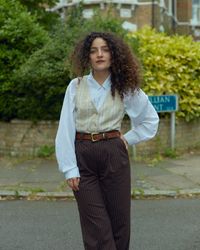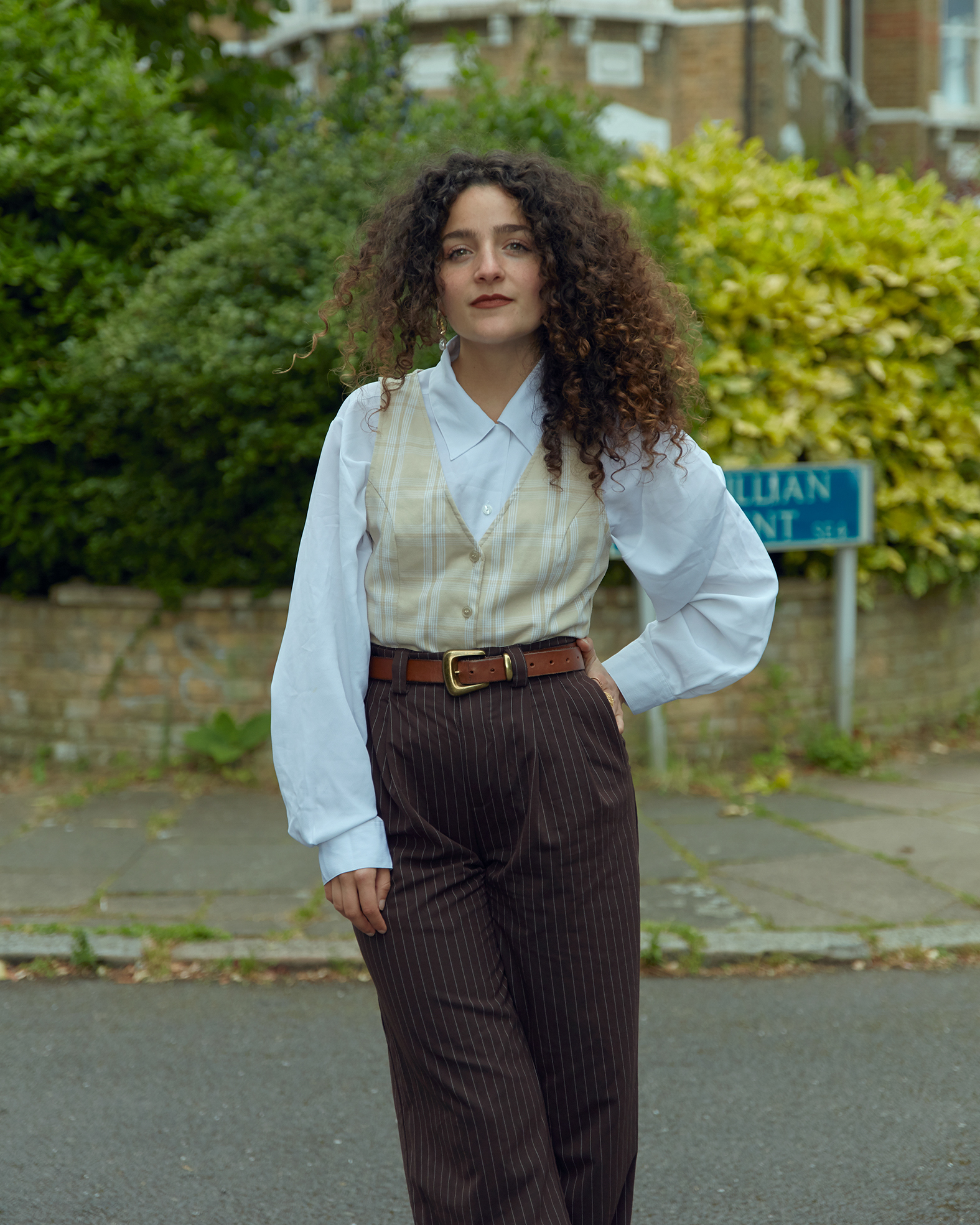Leonard Bessemer is the Burgeoning LA Furniture Maker Crafting Fancifully Playful Objects That Will Put a Smile on Your Face
From engineering and studio art to carpentry, the Objects for Objects founder's path might seem unconventional, but his cartoony works prove there are no rules in creativity — and that great furnishings can also be fun


The Livingetc newsletters are your inside source for what’s shaping interiors now - and what’s next. Discover trend forecasts, smart style ideas, and curated shopping inspiration that brings design to life. Subscribe today and stay ahead of the curve.
You are now subscribed
Your newsletter sign-up was successful
This month we are taking a moment to recognize the innovation brought about by contemporary craftsmen, makers, and emerging designers. Navigating an industry that prioritizes profit over quality, where cookie-cutter items are mass-produced at the expense of finish, originality, and the planet, artisans embody the emotional connection, human creativity, and resourcefulness necessary to deal with the challenges of today.
There’s a reason why Leonard Bessemer's curious furniture and objects resemble the protagonists of a stop-motion film more than inanimate matter. Actually, there are two reasons: "For as long as I can remember, I have always had creative instincts," the Objects for Objects founder and sole designer recalls. Fascinated with Disney animations and their ability to unveil worlds, stories, and emotions, Bessemer began to sketch his own characters as early as elementary school. "Kids would ask me to draw Aladdin or Bart Simpson," says the California-born-and-bread furniture maker. "In 5th grade, I even wrote and illustrated a book titled Simpsons and Me; they put it in the library, and it might still be there."
Even more than that, though, the odd and uplifting spiritedness of Bessemer's designs stems from his understanding of the role furniture and objects play in our lives, albeit subtly. With his studio name, he not only wanted to stress the origins of the brand — which started with the production of supportive plinths and shelving units — but also sought "to convey the autonomy of the things we surround ourselves with, how they can have a huge impact on us, hold meaning, and eventually, history."

It is a perspective that informs Objects for Objects as a whole but comes through particularly in projects like Trophy Room, a furniture display Bessemer envisioned for the Miami debut of Milanese design platform Alcova, first unveiled at the stuck-in-time Selena Gold Dust Motel in December 2023. Here, he repurposed original trophy fragments into beautifully nostalgic, iridescent furnishings, including tables, chairs, mirrors, sconces, and floor lamps. An accent bookshelf pairing golden trophy toppers with the sleekness of Carrara marble was possibly the standout piece of this series, cementing Bessemer's ability to conceive homeware that is as fantastical as it is stunningly crafted down to the finest detail.
A great deal of the self-taught carpenter and furniture maker's inventiveness comes from his interdisciplinary background. Raised in a farming city in central California, Bessemer realized at a young age that his artistic inclination could be applied to objects. Still, as his hometown "wasn't big on the arts or other aspects of culture," he enrolled in a Materials Engineering degree at a local technical state university instead. At the time, "I didn't even know what job or course of study one could do to get a job designing products," the designer recalls. "This was the early days of the internet, and social media wasn't a thing, so the whole creative world wasn't quite at everyone's fingertips yet."

As he struggled with chemistry — a major part of the course — Bessemer knew he needed to find something else. It was during this transition period that "I took a basic, intro art course and ended up spending most of my time focusing on it, neglecting the engineering courses," he says. The Los Angeles-based designer graduated with a degree in studio art and thought it could become his path. He moved to Berlin and started to work for London-born conceptual artist David Thorpe, whose "William Morris-inspired arts and crafts style objects looked like furniture, but didn't function as such," Bessemer says. "They were these massive, meticulously handmade sculptures that had some sort of defensive aspect to them as if they were protecting themselves from the viewer."
It was an experience that taught him about building things without blueprints or plans, simply by trial and error. What Bessemer couldn't learn from his hands-on practice, he would get via YouTube tutorials. So, by the time he decided to move back to Los Angeles in 2016, "I could pretty much build anything and began to make ends meet building out and making fixtures for coffee shops and retail stores", says the carpenter. His first project of this kind was a flagship for her friend Ali Golden's namesake sustainable clothing label: from there, "everything spread by word of mouth". A few years down the line, Bessemer had a whole wood shop space to himself in the Lincoln Heights neighborhood, one of the city's oldest suburbs, where he worked on his own pieces between jobs. "That's how Objects for Objects was born."
The Livingetc newsletters are your inside source for what’s shaping interiors now - and what’s next. Discover trend forecasts, smart style ideas, and curated shopping inspiration that brings design to life. Subscribe today and stay ahead of the curve.


Brand: Fazeek
Material: 100% Hand Blown Glass
Color: Lilac & Green
Price: $97.49

Brand: Objects for Objects
Material: Textile: Low-Pile Velour by Kvadrat x Raf Simons. Upholstered Wooden Frame With Foam Cushion. Hand Turned Feet in White Oak, Solid Surface (Corian), or Solid Wood Lacquered in a Solid Color.
Color: Lavender
Price: $7917.30

Brand: Fazeek
Material: 100% Hand Blown Glass
Color: Amber & Lilac
Price: $150.19
Asked about the influence that Los Angeles has on his style, the designer puts it bluntly: "The view of Los Angeles around the world often focuses on its superficiality and lack of meaningful culture — and they aren't wrong; it is part of the culture." In the City of Angels, "nothing is sacred," continues Bessemer. "If New York is a cultural rock, Los Angeles is a cultural ocean — everything is eternally moving and hard to pin down, but that also allows a certain freedom to do the unexpected, to make things that are as superficial, or serious, as you want them to be." Although, based on his observations of the city, one could say Los Angeles is almost anti-craft, the Objects for Objects founder thinks the Californian metropolis has all the craft world needs to survive, from an abundance of space and access to materials to the remnants of the manufacturing hub it used to be, like lowrider culture.
Though eye-catching surfaces and soothing palettes are integral to his aesthetic, Bessemer claims there is more to it than looks. "I like to make beautiful things that you want to touch and use," he explains. "But I also want them to make you smile, laugh, and be a little clever." After leaving the art world, the designer "fell into furniture" as a means of sustaining himself. Still, his focus was never on the profit. "For me, it was more about the challenge of learning something and perfecting it than it was about 'making a product,'" Bessemer says. Over the years, he taught himself how to spray finish and polish his objects — an achievement which, looking back now, feels "crazy" even to him. "There is a reason why there are furniture makers and there are finishers," laughs the crafter. "And they probably shouldn't be the same person."

Jokes aside, there is an avant-garde, audacious feel to Bessemer's chunky furniture creations, whose spirited choice of color, wavy lines, and contrasting materials remind me of the disruptive powerhouses of 1970s and 1980s' Italian design, like Ettore Sottsass and Paolo Pallucco to Gaetano Pesce and Carlo Scarpa. It isn't a coincidence that the once-derided bright hues and zigzag shapes of the Memphis design style have recently made a comeback (along with the imaginatively bold, plush luxury of those decades). Amusing and sophisticated, Objects for Objects is the latest studio to reinvent them for the contemporary era.
Bessemer's genius shines through in the dreamy peach and lilac collection he designed for Urban Outfitters x Clever Artist Editions, released in July 2019. Picking the High Gloss Lavender Wave Bench launched on that occasion as the piece he is most proud of to date, the designer explains that, despite its commercial nature, the initiative played a crucial role in advancing his career. "UO's Artist Editions was a truly great program that platformed a lot of emerging studios," he says, noting that his bench sold out immediately. "I still look at the images they made of it and get warm butterflies: my first real break, it proved to me that I could do this."

Fittingly, just like that artist scheme, his vision for the future of design puts independent makers at the center. Explaining how the spread of new technologies and tools could make handcrafted pieces more affordable and, therefore, accessible to a wider audience, Bessemer says that he hopes the local community will favor small-scale artisans over large retailers.
The goal? Getting "people to spend more and buy less", encouraging them to "develop attachments with their pieces that can create long-lasting relationships".

Gilda Bruno is Livingetc's Lifestyle Editor. Before joining the team, she worked as an Editorial Assistant on the print edition of AnOther Magazine and as a freelance Sub-Editor on the Life & Arts desk of the Financial Times. Between 2020 and today, Gilda's arts and culture writing has appeared in a number of books and publications including Apartamento’s Liguria: Recipes & Wanderings Along the Italian Riviera, Sam Wright’s debut monograph The City of the Sun, The British Journal of Photography, DAZED, Document Journal, Elephant, The Face, Family Style, Foam, Il Giornale dell’Arte, HUCK, Hunger, i-D, PAPER, Re-Edition, VICE, Vogue Italia, and WePresent.